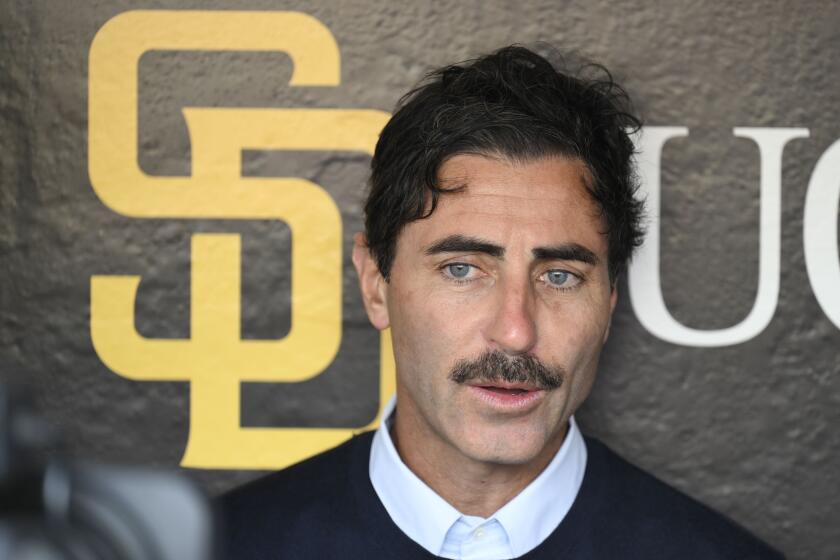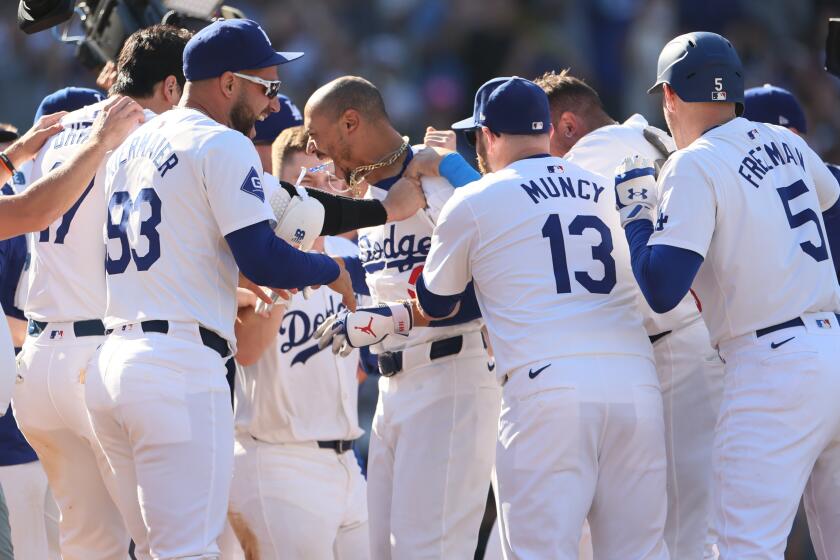Howe Wants New Contract or Free Agency
Dodger pitcher Steve Howe will become a free agent at the end of the season unless the Dodgers offer him a new contract with several provisions--including some form of deferred compensation and incentive clauses.
The Dodgers currently have a policy opposed to such provisions, but Howe’s attorney said he is hopeful of devising a “mechanism” that would satisfy Dodger policy while serving Howe’s interests.
“Steve has no grudge that I know of against the Dodgers,” said Howe’s attorney, James Hawkins of Westlake. “We think their intentions were good, and we give them credit for standing by Steve. Certainly, they gave him financial support, especially in their willingness to defray medical expenses. . . .
“But in his mind, when he signed his 1985 contract, that satisfied any legal, moral or any other obligation he had (to the Dodgers).
“He now feels free to do whatever he wants to do that’s in his best interest and the best interest of his family.”
Dodger Vice President Fred Claire would not comment on whether the Dodgers had agreed to consider renegotiating Howe’s contract. Asked if he is surprised that Howe apparently intends to file for free agency, Claire said:
“In terms of whether Steve Howe owes us more than a good performance, I don’t think so. That’s all anybody owes. Anything beyond that, any extra considerations, no.”
Howe would not comment on his intentions, but a team source said that the left-handed reliever already has decided to test his value as a free agent when he becomes eligible for the re-entry draft at the end of the season.
“Steve thinks that he could be worth more than (Pedro) Guerrero,” the source said. Guerrero, who is making $1.27 million in the second year of a five-year contract, is the highest-paid Dodger.
Relief pitchers such as Bruce Sutter and Goose Gossage have been the most sought-after commodity on the free-agent market. Sutter signed a contract this season with the Braves that, with deferred payments, could earn him $44 million.
While Hawkins said Howe bears no grudge against the Dodgers, it was learned that during bankruptcy proceedings last spring, Howe listed the Dodgers and then Commissioner Bowie Kuhn as “dischargeable obligations,” an action that might have led to Howe’s release from his contract with the Dodgers, making him a free agent.
According to a source, the possibility of such an action led Kuhn to lift in June his one-year suspension of Howe, who was sitting out the season because of drug-related offenses. However, it was agreed by all the principals that Howe should spend the rest of the season rehabilitating.
“I personally believe the settlement was reached because it was a headline case,” Hawkins said, “and it was being handled by people of good intentions.”
Claire would not comment on the bankruptcy proceedings or their effects.
Hawkins also said that when Howe agreed to sign for the 1985 season at his 1984 salary, $325,000, it was with the understanding that the Dodgers would be willing to renegotiate the contract this season.
Hawkins said that he has not approached the Dodgers about renegotiating. “We have to see some better stats on the board, obviously,” Hawkins said.
Howe has appeared in six games this season. He has an 0-1 record, one save and a 9.00 earned-run average in five innings of work. Tuesday at Chicago, he pitched two innings, his longest outing of the season, and has yet to work in back-to-back games.
“There are two things they (the Dodgers) want to judge,” Hawkins said. “One is how well Steve has done personally, and two is how good his arm is since his surgery.”
Howe had surgery to re-route the ulnar nerve in his left elbow on Jan. 9.
“Hopefully, we’re moving into a period of time where both of these are being demonstrated,” Hawkins said.
When asked if he had any deadline for renegotiation, Hawkins said: “I don’t draw lines in the sand. Not yet.
“I’m not expecting any offer for the long term soon, but the implication from the Dodgers was that if Steve shines, they’ll take a close look and wouldn’t hesitate to renegotiate toward the middle of the season.
“We’re simply waiting to see. There has not been any kind of confrontation at this point in time.”
Hawkins, whose expertise is in corporate tax law, said that in preparing Howe’s contract proposal, he has conceived an “innovative” financial structure that includes deferred compensation and incentive clauses in a way that the Dodgers might find acceptable.
“When a team is losing money, the consequence of giving some of these packages has no real effect on what the bottom line would be from a tax perspective,” Hawkins said.
However, for a team making money, such as the Dodgers, Hawkins said, “it could have a substantial impact taxwise. We’re working on a solution that I think would benefit both Steve and the Dodgers.”
Whether the Dodgers, who do not include any incentive clauses or deferred compensation in player contracts, would be willing to adjust their policy remains to be seen.
“I don’t think Steve has as much hope as I do,” Hawkins said. “He doesn’t believe they’ll make an offer that’s acceptable. He hasn’t seen it in four years. He hasn’t been in a good bargaining position in four years.
“This is the first time Steve has had any opportunity to test the waters. The Dodgers will have the first opportunity to negotiate, and we’ll negotiate in good faith. But if we can’t reach an agreement, Steve will be out there in the market.
“I don’t want Steve to leave L.A. I don’t think Steve and Cindy (Howe’s wife) want to leave L.A.”
Howe was one of the National League’s most dominating left-handed relievers before his cocaine dependency interrupted his career during the 1983 season, when he was suspended twice by the Dodgers.
He has yet to demonstrate that dominance this season, although his fastball reportedly has been clocked as high as 94 m.p.h. at least once.
“The bottom line is whether I produce on the field,” Howe said. “It doesn’t have to do with drugs, but whether I do my job on the baseball field, period.”
More to Read
Are you a true-blue fan?
Get our Dodgers Dugout newsletter for insights, news and much more.
You may occasionally receive promotional content from the Los Angeles Times.








